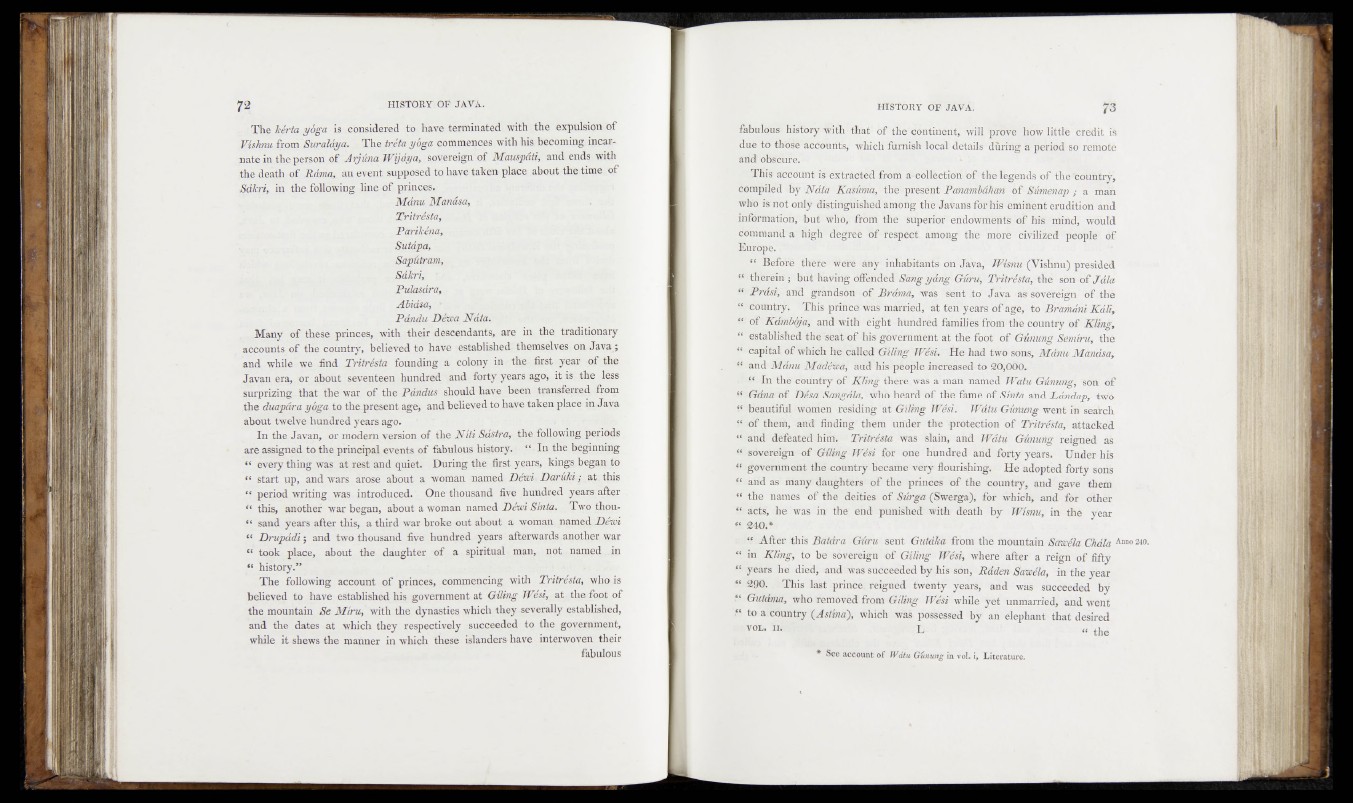
The k&rta ybga is considered to have terminated with the expulsion of
Vishnu, from Suraldya. ; The trStaybga qommences with his becoming incarnate
in the person of Arjiina Wijaya, sovereign of Mauspdti, and ends with
-the death of ltdma, an event supposed to have taken- place about the,time ..of
■ Sd/cri, in the following line of princes.-.
MdnuMandsa,
Tritresta,
Parikena,
Sutdpa,
SapUtram,
Sdkri, i
Pulasdra,
Abidsa, !
Pandu Devea Ndta,
Many of these princes, with their descendants, are in the traditionary
accounts of the country, believed to have established- themselves on-Java^;
and while we find Tritrdsta founding a colony in thq first year of the
Javan era, or about seventeen hundred and forty years ago, it is. the less
surprizing that the war of the Pdndus should have been transferred from
the duapdra ybga to the-present age, and believed to have taken place in. Java
about twelve hundred years ago.
In the Javan, or modem version of the Niti Sdstra, the following periods
are assigned to the principal events of fabulous history. “ In the beginning
“ every thing was at rest and quiet. During the first years, kings, begap to
« start up, and wars arose about a woman named JDdwt, Dardkt; at. this
« period writing was introduced.' One'thousand five hundred years after
“ this, another war began, about a woman named D&wi Sinta. Two thou-
“ sand years after this, a third war broke out about a woman named DSm
** Drupddi; and two thousand five hundred years afterwards another war
** took place, about the daughter of a spiritual man, not named in
.“ history.”
The following account of princes, commencing with Tritrista, who is
believed to have established his government at Oiling Wesir at . the foot of
the mountain Se Mini, with the dynasties which they severally established,
and the dates at which they respectively succeeded to the government,
while it shews the manner in which these islanders have interwoven their
fabulous
fabulous Mstbry-'With.- that- of 'tfie^imntidéritj^will prove how little credit is
due to those accounts, which furnish fecal- detâils^dùring a period so1 remote
and' obscure. ■
This account is extracted from a collection of the legends of ' the 'bouhtry,
éompiled by Wdta ■ Momma, thé -ptésènt Panam¥â%an '^m^Sdmenap. • a man
whte> is'not only distinguished'among tfelJavans for his en^ient erudition and
informafioft- 'but who, from thé superior eàdoWmënts1 -m hi's-jmind, would
c'omttfah'tl a high- dègreè &f ïèspÊc'f among th'e^More civilized1 people- of
Europe. - "
“ Before thete'J we¥é -any inhabitant öö Java, Wisnu (yishnu) presided '
* 1 therein ; but having offended Sâng ydng Guru, Tritfésta,*thé son-of Jala
Prdsi, and grandson o f Brdma, was sent Ito*-<Java a#sov^eign öf th'è
« country. This prhméwàsmérned, at teriyeahs^age;7 to Bramant Kdli,
of J tdmbbja, and with èight hundred families from the feduntry of Kling,
“ established the seat of his government at the foot of Gunung Semiru, thé
“ capital of which he called Gtiing Wési. “He had two sons, Miinu* Màndsa,
If sand' Manu Màdéi&a, aud'his pèople incfeased-to SÖjOOO.- -
it! *.*-In thé country of Kling there.was à*man named Watu Gdnwig, óf
tf Gdna of Désa 'Sanigdla, who heard of the famé of^Sinta and Kdndap, two
*‘ beautiful-women residing at1 GUing JVési. Wdtu Gunung went in search
“ of them, and finding them under the protection of Tritresta, attacked
*f and defeated him. : Tribeste Was slain, and Watu Gunung reigned as
** sovereign -of Gtüng Wési fef one hundred and .forty years. Under- hïs
a -government the country became very flourishing. He adopted forty sons
f * afrd as" many daughters of the princes' öf the country* and gavé them
“ the names of" thè deities of Sdrga {Swerga*), for which} and for Other
“ acts, he was in' thé end punished with death by Wisnu, in the year
“ 240.*
- *‘ After this Batdra Guru sent Gutakci from the mountain Saxbéla Chdla Anno 2i0-
“ in Kling, to be sovereign of Giling Wést, where after a reign of fifty
“ years he died, and was succeeded by his son, Rdden Soeméla, in the year
“ 290. This last prince, reigned twenty years, and was succeeded by
f* Gutama, who removed from Gikng West while yet unmarried, and went
f* to aicountry (Astma), which was- possessed by an elephant that desired
- V°B. n. L " • « thé
* See account of Wdtu Gunung in vol. i, Literature.